Ensuring Ethical and Efficient AI with ISO 42001:
Why Businesses Should Adopt This Standard
The deployment of AI systems has the potential to transform industries, enhance productivity, and drive innovation. However, alongside these benefits come substantial risks, particularly concerning ethics, fairness, transparency, and accountability. To address these issues, the International Organization for Standardization (ISO) has developed ISO 42001, a standard designed to ensure that businesses develop, implement, and maintain AI systems in an ethical and efficient manner.
This article explores why adopting ISO 42001 is crucial for businesses leveraging AI technology.
Understanding ISO 42001
ISO 42001 provides a comprehensive framework for the management of AI systems, focusing on ethical principles, governance, risk management, and continuous improvement. The standard encompasses several key areas:
Ethical Principles:
- ISO 42001 emphasises the importance of ethical considerations in AI, such as fairness, transparency, accountability, and privacy. It provides guidelines to ensure that AI systems do not perpetuate biases or discriminate against individuals or groups.
Governance:
- The standard outlines governance structures and responsibilities to ensure that AI systems are managed effectively. This includes defining roles and responsibilities, establishing oversight mechanisms, and promoting a culture of ethical AI use within the organisation.
Risk Management:
- ISO 42001 requires businesses to identify, assess, and mitigate risks associated with AI systems. This includes addressing potential negative impacts on individuals, society, and the environment, as well as ensuring the security and reliability of AI technologies.
Continuous Improvement:
- The standard encourages continuous monitoring and improvement of AI systems. Businesses are required to regularly review and update their AI policies and practices to adapt to evolving ethical standards and technological advancements.
Why Businesses Should Adopt ISO 42001
Ensuring Ethical AI Practices:
- Adopting ISO 42001 helps businesses align their AI practices with ethical standards. By embedding ethical principles into the development and deployment of AI systems, companies can avoid biases, discrimination, and other unethical outcomes. This not only protects individuals and society but also enhances the company’s reputation and fosters trust among customers, partners, and regulators.
Enhancing Transparency and Accountability:
- Transparency and accountability are critical in gaining the trust of stakeholders. ISO 42001 requires businesses to implement transparent AI processes and maintain clear documentation. This enables stakeholders to understand how AI decisions are made and hold the organisation accountable for any adverse outcomes. Enhanced transparency can also facilitate regulatory compliance and reduce the risk of legal issues.
Mitigating Risks and Enhancing Security:
- The risk management component of ISO 42001 ensures that businesses proactively address potential risks associated with AI systems. By identifying and mitigating risks early, companies can prevent security breaches, data privacy violations, and other negative consequences. This not only protects the organisation but also safeguards customer data and maintains the integrity of AI systems.
Promoting Innovation and Competitiveness:
- Adopting ISO 42001 can drive innovation by encouraging the development of AI systems that are both ethical and efficient. By adhering to ethical guidelines and continuously improving AI practices, businesses can create more reliable and trustworthy AI solutions. This can enhance the company’s competitiveness in the market, attracting customers who prioritise ethical AI usage.
Building Customer Trust and Loyalty:
- Customers are becoming increasingly aware of the ethical implications of AI. Businesses that demonstrate a commitment to ethical AI practices through ISO 42001 certification can build stronger relationships with their customers. Trust and loyalty are essential for long-term success, and adopting ISO 42001 can help businesses differentiate themselves as responsible and ethical AI users.
In an era where AI is reshaping industries and society, adopting ISO 42001 is a strategic decision for businesses. This standard provides a robust framework for ensuring that AI systems are developed, implemented, and maintained in an ethical and efficient manner. By embracing ISO 42001, businesses can mitigate risks, enhance transparency, and build trust with stakeholders.
Ultimately, ISO 42001 is not just a standard; it is a commitment to responsible AI usage that can drive innovation, competitiveness, and sustainable growth and for any business aiming to leverage AI technology, adopting ISO 42001 is a crucial step towards ethical excellence and long-term success.





